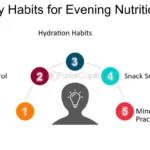“Mindful Eating Habits” Eating a plant-based diet reduces some health risks a lot. These include obesity and heart problems. Ayurveda originates from ancient India. It’s taught us how to be healthy.
It focuses on our minds, bodies, and spirits. The Ayurvedic diet helps balance Vata. It also helps balance Pitta and Kapha doshas. It does this by choosing foods that suit you.
Know your dosha and eat right to feel good. These top 7 habits will help you eat for better health.

What is the Ayurvedic Diet?
The Ayurvedic diet is about eating for health. It has been in India for a very long time. According to the text, three energies called doshas – vata, pitta, and kapha – make up our being. Eating the right foods can balance these doshas.
Your dosha type affects how you feel and look. Vata is air and space, pitta is fire and water, and kapha is water and earth. Keeping these balanced is key to good health.
The diet stresses eating whole, fresh foods that match your dosha. For example, vata people do well with warm foods like soups. Pitta types find cool foods helpful, such as greens. Kapha types do best with spicy, light meals.
Choosing foods that fit your dosha helps in many ways. It aims to bring balance, better digestion, and health. This diet is one part of a big health system. It also cares about sleep, exercise, and stress.
Ayurveda views the human body as a small part of the universe. It has the same basic elements and rules.” – Deepak Chopra, renowned Ayurvedic practitioner
Benefits of the Ayurvedic Diet
The Ayurvedic diet brings many good things for our health. It tells us to eat whole foods and cut back on processed ones. This way of eating can help us lose weight. It also fights big health problems. These include heart disease and diabetes.
This diet teaches you to eat with focus and care. It reduces stress and stops binge eating. This leads to a healthier and happier life.
Whole Foods and Chronic Disease Prevention
It asks for fresh, local fruit, veggies, and grains. These foods are full of good things that keep us healthy. They make our bodies strong against diseases. In short, they’re better than processed foods that can harm us.
Potential for Weight Loss
Many studies say that the Ayurvedic diet helps people. It’s helped them lose weight. In one study, 200 people lost a lot of weight in three months. Another study found that people lost about 13 pounds in nine months.
Savoring each bite brings benefits. So does having different tastes in our meals. It’s making us feel full and our digestion better.
An Ayurvedic diet and lifestyle can improve your health. It’s can prevent disease. It can help with weight control. It can foster mindful eating.

Mindful Eating Habits
Ayurvedic principles recommend savoring each bite. You should do so with intentional awareness. This is very important for us. Being mindful while eating means that we should pay attention a lot. We look at our food, smell it, and think about how it feels. Doing this can make us feel better and healthier.
This way of eating helps us control ourselves better. We discover the urge to eat when our stomachs are empty. The Ayurvedic way of eating tells us to pay full attention to our meals. This helps us be thankful for the food that gives us energy.
Mindful eating involves paying complete attention. You consume food and beverages. It’s about using all your senses to explore, enjoy, and savor the flavors. You use your senses to enjoy the smells, feels, and colors of your food.
Eating with awareness changes our feelings. It changes our minds. Enjoying every bite gives us more joy. It also lifts our mood. According to Ayurveda, we’ve made our body and mind strong by eating this way.
Mindful eating habits need a big change. It’s a change in our behavior. We can do this by not using phones when we eat. Or by thinking about where our food comes from. These small things can help us love our food more and be healthier.
- Turn off your phone and stop watching TV while you’re eating.
- Think about how your food looks and smells before you eat it.
- Savor each bite. Chew well to avoid overeating.
- Notice when you are full and stop eating then.
- Be thankful for the food in front of you and it’s who made it.
We’ve connected with our food through Ayurveda. It has a thoughtful eating approach. We enjoy eating more and keep our body and mind strong.
Principles of the Ayurvedic Diet
The Ayurvedic diet helps balance the three doshas – vata, pitta, and kapha. It does this with special foods and eating times. This eating plan includes foods for your dosha. It also has set eating times. Eating fresh, good-quality foods helps. Focusing when you eat also helps. This way, you can feel good and stay healthy.
Tailored Food Choices
In Ayurveda, everyone has a unique mind-body type, or dosha. To stay in balance, choose foods that oppose your dosha. For example, those with a kapha type may like foods that are pungent or bitter. If you’re vata, you might prefer foods that are sweet or sour.
Eating Routines
Eating on a regular schedule is key in Ayurveda. Avoid eating snacks between meals. It can mess up your digestion, causing issues. Eating your main meal at lunchtime is best. It’s aid digestion. Light meals are good at night for staying healthy.
Food Quality and Freshness
The Ayurvedic diet loves fresh, high-quality food. It recommends whole, unprocessed food. The food has plenty of prana. This means eating fresh, local foods. It also means that it’s Ayurvedic spices, such as turmeric. Such foods are full of good energy and help keep you well.
Mindful Eating
Mindful eating is crucial in Ayurveda. It means focusing on your meal with no distractions. Savoring each bite is key. This practice requires meticulous attention to detail. It helps with digestion and makes sure you’re getting the most out of your food.
Ayurveda advises us to stop eating. We should stop three hours before bedtime. This lets the body focus on repair, healing, and restoration. It’s what happens during sleep.

Know Your Dosha
Figuring out your main Ayurvedic dosha is the first key step in the Ayurvedic diet. There are three main life forces in Ayurveda: Vata, Pitta, and Kapha. Each has its own physical traits. They also have unique mental traits.
Vata types might be creative and full of energy. Pittas are smart and ambitious. Kaphas are often very peaceful and steady. Knowing your dosha helps you pick the right foods. It also helps you pick the right lifestyle. This choice is for improved health and happiness.
You can learn your dosha by talking to an Ayurveda expert or using online tools. These tools help you find your main dosha. They also show any imbalances. With this knowledge, you can pick things that are good for your dosha’s needs. This includes what you eat and what you do.
Knowing your dosha is the first step. It leads to balance and harmony in the body and mind. – Dr. Vasant Lad, renowned Ayurvedic physician
Now that you know your dosha, you can start living by Ayurvedic beliefs every day. This could mean changing what you eat. It could mean adding special spices and herbs. It means savoring each bite with intention. These steps will help you get the best out of Ayurveda for your wellness.

Six Tastes of Ayurveda
According to Ayurveda, a perfect meal has six tastes. These include sweet, sour, salty, and pungent. They also include bitter and astringent. Such a mix helps in digesting food well and stops overeating. It does this by exciting all the different parts of your tongue.
Each person’s dosha, or mind-body type, determines how much of each taste to have. But the main idea is to get a mix of flavors. Nourishment supplies your body. It also fuels your mind.
Understanding the Six Tastes
- Sweet tastes help Kapha, but can harm Vata and Pitta. Think of foods like milk, root vegetables, and sweet fruits.
- Salty foods help Pitta and Kapha without hurting Vata. Seaweed and fish fit into this group.
- Sour foods boost Pitta, Kapha, and help Vata. Examples are tomatoes and pickled foods.
- Pungent foods might overstimulate Pitta and Vata. But, they balance Kapha. Foods like ginger and chilies are pungent.
- Bitter foods can upset Vata more than astringent ones. Yet, they help balance Kapha and Pitta. Bitter melon and greens are examples.
- Astringent tastes balance Kapha and Pitta. They can do too much for Vata, though. Pomegranate and broccoli are astringent foods.
Eating all six Ayurvedic tastes at once is satisfying. It satisfies one’s appetite. It also helps with digestion, emotions, and its health.
Ayurveda involves adding six tastes to each meal. They’re sweet, salty, sour, and pungent. They’re also bitter and astringent.
Cooking meals with the six Ayurvedic tastes boosts good digestion. It also stops overeating. This way of eating is key in Ayurveda living.

Freshness and Quality
Ayurveda teaches that fresh food is best. It should be in season. They must come from nearby origins. They help us stay healthy and feel good. Processed, canned, or old foods are not good for health. They can mess with our bodies. Eating fresh food is key. It’s what makes the food more nutritious and helpful.
Choosing the freshest and most colourful foods is key. It helps our bodies heal and stay balanced. Ayurveda teaches that fresh foods have a unique energy. This energy is what keeps us healthy and happy.
- Local produce is better. It’s from nearby and in season. It’s better than things that come from far away or are not in season.
- These foods have fewer nutrients. Canned or preserved foods. They have less nutrients than fresh food.
- Ayurveda emphasizes eating food. We keep changes to the text to a minimum. This way, we get the most benefits from what we eat.
Adding fresh, colorful foods to your diet can change your health in big ways. It’s about eating the things that are in season around you. And, choosing foods that aren’t changed a lot after they’re picked. This helps you get the most out of what you eat. It keeps your body’s balance in check.
The food we eat is the building material for our body, mind, and consciousness. Ayurveda stresses choosing the freshest ingredients. They must be the most vital. They nourish and sustain us.
Ayurvedic Eating Routines
Ayurveda is a very old system from India. It cares a lot about eating at the right times. It says that our bodies digest food best around noon. This is when our digestive fire, Agni, is strongest.
Eating at the right times helps our bodies work better. Afternoon meals should be smaller. This lets our bodies focus on resting and fixing themselves at night. Eating this way also keeps our bodies strong and healthy.
Great focus is on enjoying and being aware while eating. You should taste and feel your food. This way of eating helps you relax. It makes digestion better and makes you feel good about food.
You should eat the main meal at noon. This is when your digestive fire (Agni) is strongest. Have lighter meals in the evening. They support good digestion and health.
Doing Ayurvedic eating can help you stay healthy and full of life. It follows your body’s natural daily cycle.
The Ayurvedic way of eating is different for everyone. It depends on your own dosha (body type). Talking to an Ayurvedic doctor can help you eat in the best way for you. This can make your stomach and body feel good.

Food and Mind Connection
Ayurveda is an old Indian health system. Our mind and body are linked to what we eat, according to it. Our food choices can connect to feelings like it’s lust and anger.
It talks about being content, excited, or lazy. This depends on the foods we eat. Our choices can change how we’ve affected our health.
Mindful Food Choices for a Healthy Mind and Body
Thinking about what we’ve eaten can make us feel better. Mindfulness, as Jon Kabat-Zinn says, means we focus on the present. We do this without judging. This can make our food choices more thoughtful. It joins our minds and bodies.
Consuming food with precision enhances one’s well-being. It can help you lose weight and make digestion better. A study showed that mindful eating. It makes people choose healthier foods. It also helps them eat enough.
Adding Ayurveda and mindful choices to our days can do a lot. It can keep our minds and bodies healthy. Knowing how food affects us helps us make better choices. It lets us avoid problems and enjoy it more.

Enhancing Digestion
The Ayurvedic diet aims to improve digestion. This is for good health. It uses your dosha to help improve how you digest food. This can help fight problems. It can help fight bloating. It can also fight indigestion and constipation.
It’s important to have all six tastes at each meal. The tastes are sweet, sour, salty, and pungent. They are also bitter and astringent. They help boost your agni, your digestive power. This leads to better nutrients from food. It improves your health.
Ayurveda also talks about eating. It says you should pay close attention. This way, you eat the right amount for your body. You’ll enjoy food more and avoid eating too much. This is great for digestion.
When we’ve eaten with awareness and attention. We are more likely to make choices that support our body and digestion.
Choosing fresh, local, and seasonal food is a big part of this diet. These foods pack a lot of nutrients. They help your digestion and keep you healthy.
This kind of diet can make you digest food better and get more nutrients. You’ll feel more balanced and healthy. It’s a great way to stay well and not get sick often.
Unlocking the Power of Mindful Eating
Mindful eating is very important in the Ayurvedic diet. It requires full focus. You must focus on your food during meals. This can help a lot with how well you digest food and feel.
- You’ll know better when you’re hungry or full, which can help you not eat too much.
- Eating this way makes meals more enjoyable. You’ll like and appreciate your food more.
- It helps your body to digest food well because of the “rest and digest” mode it’s activated.
- This way of eating can make you feel less stressed and anxious. That’s good for your digestion and your health in general.
- This tool selects foods for your unique body.
Adding intentional eating habits helps the diet. You follow Ayurveda. You’ll see good changes in how you digest and feel, bringing lots of health benefits.

Boosting Nutrient Absorption
The Ayurvedic diet focuses on what you need most. It changes how well your body uses key nutrients. By choosing foods that match your body’s type, you get the best nutrition. This leads to feeling better. It also gives you more energy and better health.
A big plus of this diet is that it helps you use nutrients better. Meal choices in the Ayurvedic way are all about whole, fresh, and organic foods. They should be in season. This improves your body’s digestion. So, it uses nutrients better. You eat in ways that can help reduce tummy troubles and make your gut healthier. This helps your body do more with what you eat.
Mindful eating is a big part of the Ayurvedic lifestyle. A 2023 study in the Journal of Nutrition showed that it’s helpful for your body. It helps to get key nutrients. These nutrients include iron and calcium. Different studies in Nutrients found this. They found that mindful eating helps people. It helps those with health problems. It helps them absorb and use nutrients well.
If you eat according to your Ayurvedic type, you get all the good stuff from your food. This way of eating looks at what your body and digestion need. It makes sure you get the right mix of big nutrients, and vitamins. This helps boost your energy. It helps you feel healthier. And, it helps your body use food’s goodness better.
Choosing food the Ayurvedic way is great. It helps you get more nutrients. This doesn’t help your body. It also boosts your mind, mood, and makes you feel lively. Eating right in the Ayurvedic style does a lot more than make your body healthy. It helps you feel great, sharp in mind, balanced in heart, and full of life.
Preventing Chronic Diseases
The Ayurvedic diet helps us stay healthy. It works well against long-term sickness. It keeps Vata, Pitta, and Kapha in balance. This stops sickness before it starts.
Studies found big wins with the Ayurvedic way. For those with diabetes, mindful eating led to an 8.4-pound loss. It also cut their sugar intake.
Eating fresh and in season is key. It helps our bodies use food well. This prevents heart disease. It stops serious health issues.
- Mindful eating improves how we eat. It guides our food selection. This approach lowers the risk of illness.
- Eating with awareness helps us spot when we’ve eaten from stress. This cuts down on stress eating.
- Ayurvedic eating keeps our doshas in balance. This reduces stress and helps our hormones. It could lower the risk of heart problems and other issues.
Mixing Ayurveda with mindful eating is smart. It’s a strong step against sickness. This way, we’ve stayed healthy for a long time. It focuses on the real causes of sickness.
Mindful eating can help people appreciate food. It can also help them make healthier food choices. And it can make them more attuned to their body’s signals of hunger and fullness.
Getting Started with Ayurveda
Interested in Ayurveda? Start by seeing an Ayurvedic practitioner. They’ll look at your dosha, which is your Ayurvedic body type. They’ll also check for any imbalances. Then, they’ll help you plan meals for you.
An Ayurvedic practitioner can also teach you how to pick and use spices well. Spices are key in Ayurvedic cooking. Knowing about them can make your diet even better.
As you follow Ayurveda, pay attention to your body. Think about how you feel after eating. Keep a diary to see what helps or needs changing in your meals or habits. “Mindful Eating Habits”
With a good Ayurvedic practitioner and by listening to your body. Ayurveda can lead you to a healthier life.
Ayurveda is not a diet or a set of rules; it’s a holistic approach to health and wellbeing. Collaborate with an experienced Ayurvedic practitioner. They can help you unlock the full potential of this ancient practice. You can also transform your relationship with food and your body.
You May Also Like:
7 Ayurvedic Tips for Daily Vitality
Integrating Mindful Practices
Mindful Ayurvedic practices are key. They are important for good eating habits. They help you stay in the moment and cut out distractions at meals. This way, you learn to listen to when you’re hungry and when you’re full. It makes your relationship with food healthier. It also makes it richer. “Mindful Eating Habits“
Practicing intentional eating fosters positive change. It can make a big difference. It can better what you eat, how you eat, and how you feel. Being mindful helps you be kind to yourself, not hard on yourself when you eat out of emotions. It can also reduce episodes of eating a lot when feeling down or stressed.
In Ayurveda, mindful eating is key. It means appreciating each meal. This requires focus and thankfulness. This leads to better self-discipline. It also means less worry and feeling good about your health.
- Be aware during your meals. This will help you connect with the food.
- Reduce distractions while eating. Stop multitasking. Take part completely. Immerse yourself in nourishment for your body.
- Tune in to your body’s hunger and fullness cues. They can help you have a healthy relationship with food.
- Be kind to yourself. Avoid judging yourself. This is especially true when eating for emotions. It is also true when bingeing.
- Approach meals with gratitude. Appreciate the nourishment your food provides.
Consuming food demands focused awareness. It must be on the current experience. It’s about savoring each bite. Savor each bite to experience the full flavor of your meal. Taste its flavors, textures, and smells. It’s a great way to foster a healthy relationship with food.
By adding Ayurvedic mindful habits to your daily life, you get to know your body well. This understanding leads to a positive and lasting way of eating. It’s not good for your body. It boosts your mood and mind, making your life more complete and healthy.
Conclusion
The Ayurvedic diet is all about taking care of your health in a natural way. It tells us to pick foods that match our bodies and things like that. If you eat the right way, it can make your health better and your life more balanced. This diet gives us good tips for staying healthy or getting better if we’re not well.
With Ayurveda, you can learn how to eat in a good way. This shows your real hunger. It also shows your satisfaction cues. It can help you keep a good weight. It boosts self-esteem and makes food a positive thing.
The Ayurvedic diet is big on balance. Emphasize everything that is linked. This can help you pick better foods. It’s also going to help you get more nutrients and lower the chance of getting sick. Choosing this diet can lead you to a life that feels right and full of energy.









